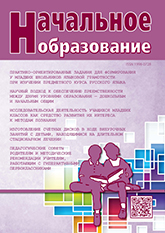В статье характеризуются результаты исследования по развитию эмоционального интеллекта студентов, изучающих иностранный язык в Университете им. Алламе Табатабаи в Иране. В ходе исследования применялся квазиэкспериментальный метод в форме предварительного и последующего тестирования контрольной и экспериментальной групп слушателей. Анализируются полученные результаты, позволяющие обосновывать целесообразность повышения уровня эмоционального интеллекта обучающихся для более успешного совершенствования ими навыков разговорной речи, аудирования, письма и чтения на иностранном языке.
эмоциональный интеллект; позитивное учебное взаимодействие; повышение успеваемости; изучение иностранного языка; освоение навыков разговорной речи, чтения, аудирования, письма
1. Abdolrezapour P. Improving Learners' Oral Fluency through Computer-Mediated Emotional Intelligence Activities. ReCALL, 2017a, 29 (1), 80-98.
2. Abdolrezapour P. Improving L2 Reading Comprehension through Emotionalized Dynamic Assessment Procedures. Journal of Psycholinguistic Research, 2017b, 46 (3), pp. 747-770.
3. Abdolrezapour P., Tavakoli M. The relationship between emotional intelligence and EFL learners’ achievement in reading comprehension. Innovation in Language Learning and Teaching, 2012, 6 (1), pp. 1-13.
4. Abdolrezapour P., Tavakoli M., Ketabi S. Qualitative analysis of mediational strategies in emotionalized dynamic assessment of L2 reading comprehension. IJRSLL, 2014, 3 (1), pp. 51-66.
5. Chamot A.U. The role of learning strategies in second language acquisition. In M.P. Breen (Ed.). Learner contributions to language learning: New directions in research. Harlow, England: Longman, 2001, pp. 25-43.
6. De Raad B. Differential psychology. In A.E. Kazdin (Ed.). Encyclopedia of psychology. Oxford: American Psychological Association and Oxford University Press, 2000, pp. 41-44.
7. Dörnyei Z. The psychology of second language acquisition. Oxford: Oxford University Press, 2009.
8. Dörnyei Z., Skehan P. Individual differences in second language learning. In C.J. Doughty & M.H. Long (Eds.). The handbook of second language acquisition Oxford: Blackwell, 2003, pp. 589-630.
9. Eisenberg N. (Ed.). Volume 3: Social, emotional, and personality development. In W. Damon & R.M. Lerner (Series Eds.). The handbook of child psychology. New York: Wiley, 2006.
10. Gkonou C., Dewaele J.M., King J. The emotional rollercoaster of language teaching. Bristol: Multilingual matters, 2020.
11. Goleman D. Emotional intelligence: Why it can matter more than IQ. New York: Bantam Books, 1995.
12. Hansen J.Q., Stansfield C.W. The relationship of field dependent independent cognitive styles to foreign language achievement. Language Learning, 31, 1981, pp. 349-367.
13. King D.B. Rethinking claims of spiritual intelligence: a definition, model, and measure. Unpublished Master’s Thesis, Trent University, Peterborough, Ontario, Canada, 2008.
14. Kryshko O., Fleischer J., Waldeyer J., Wirth J., Leutner D. Do motivational regulation strategies contribute to university students’ academic success? Learning and Individual Differences, 82, 2020, pp.101-112.
15. MacCann C., Jiang Y., Brown L.E.R., Double K.S., Bucich M., Minbashian A. Emotional Intelligence Predicts Academic Performance: A Meta-Analysis. Psychological Bulletin, 146 (2), 2020, pp.150-186.
16. Oxford R., Ehrman M. Second Language Research on Individual Differences. Annual Review of Applied Linguistics, 13, 1993, pp. 188-205.
17. Papi M., Abdollahzadeh E. Teacher Motivational Practice, Student Motivation, and Possible Selves: An Examination in the Iranian EFL Context. Language Learning, 62 (2), 2012, pp. 571-594.
18. Parker J.D.A., Summerfeldt L.J., Hogan M.J., Majeski S.A. Emotional intelligence and academic success: Examining the transition from high school to university. Personality and Individual Differences, 36, 2004, pp. 163-172.
19. Petrides K.V., Sangareau Y., Furnham A., Frederickson N. Trait emotional intelligence and children’s peer relations at school. Social Development, 15 (3), 2006, pp. 537-547.
20. Salovey P., Mayer J.D. Emotional Intelligence. Imagination, Cognition and Personality, 9, 1989, pp.185-211.
21. Sánchez-Álvarez N., Martos M.P.B., Extremera N. A Meta-Analysis of the Relationship between Emotional Intelligence and Academic Performance in Secondary Education: A Multi-Stream Comparison. Frontiers in psychology, 11, 2020, 15-17.
22. Song L.J., Huang G.H., Peng K.Z., Law K.S., Wong C.S., Chen Z.J. The differential effects of general mental ability and emotional intelligence on academic performance and social interactions. Intelligence, 38, 2010, pp. 137-143.
23. Yin H., Chi-Kin Lee, J., Zhang Z. Catering for learner diversity in Hong Kong secondary schools: Insights from the relationships between students’ learning styles and approaches. ENCU Review of Education, 2020, pp. 1-22.






